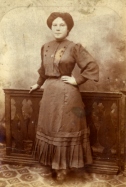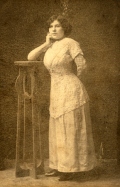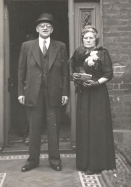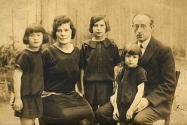|
|
|
|

|
 |
|
[L]: London, 1906, [R]: London, 1910
Early photo shows her still wearing her Eastern European dress; Later
photo shows her in a more fashionable big city dress |
|
| |
|
Brajna Kowalska was born in Radzilow in December 1891, the third of
five children of blacksmith Izrael Moszk Kowalski and his wife Leja (nee Linenberg), who had married in 1876.
|
|
|
|

|
|
London, 1909 |
|
|
| |
|
In February 1900, Izrael Moszk died, aged approximately 42, leaving
Leja with four daughters and a son to bring up on her own. This task would
have been made slightly easier as her eldest daughter was around 20 and
about to be married. Her youngest, however, was only about 18 months old.
The Kowalski family was a large family of blacksmiths and it appears that
they rallied round and supported Leja and her children. Around 1905, she had
made the decision to marry Izrael Moszk's youngest uncle, Mejer Zvi Kowalski,
who was then about 62 years old - around 10 years her senior. Brajna was, by
then, 13 years old, and had heard some worrying stories of households that
included a step-father and decided that she wasn't prepared to tolerate having
one of her own.
What followed was a remarkable emigration story. Leja had a much younger
brother, Chaim Alter Linenberg, who had settled in London in the 1890s and had
married another Radzilow native, Etka Szwarcberg, there in 1901. Brajna made the
decision to go to London to join her uncle and aunt, despite
her young age and having no adult companion. Furthermore, Etka's niece, Szejna
Apelbaum was to join her on the voyage, aged only 9.
And so it was that these two young girls made their way to London in 1905,
with only each other for company and protection. Unfortunately, immigration
records for the UK do not cover ships arriving from European ports, so their
exact date of arrival cannot be verified.
Once safely in Britain, Brajna lived with her uncle and aunt, while Szejna
was brought up by Etka's brother, David Blackman, and his wife. Brajna learned
to be a buttonholehand, working for a family called Rosenberg, and quickly
became very skilful. Many years later, long after Brajna had married, Mr
Rosenberg would take the toughest and most urgent jobs to her and beg her to
help him.
|
|
|
|

|
|
Solly and Brina Tiskofsky,
London, 1952 |
|
| |
|
|
|
|
|

|
|
Tiskofsky Family, London 1923
[L-R]: Hannah (Anne) Tiskofsky (later Gaden); Brajna (Brina) (nee
Kowalska) Tiskofsky; Miriam (Mary) Tiskofsky (later Ziman) Jane
Tiskofsky (later Goodman) Zelig Tyszkowski
(aka Solly Tiskofsky) |
|
|
| |
|
As well as her job, Brajna helped her uncle and aunt to bring up her numerous Linenberg cousins. Although she never had the opportunity to go to school in
Britain, she taught herself English and became a great reader, enjoying works by Chekov and Ibsen and developing a passion for history. She also taught herself
to write English, but preferred not to, as she was not confident of her
spelling.
In 1914, she married tailor Zelig Tyszkowski (later Solly Tiskofsky), another Radzilow native who had
come to London with his parents and siblings in early 1901. Brajna and Zelig had
five daughters and created a loving home. She emphasized the importance of
education and, through musical scholarships, her daughters were educated at some
of the finest schools in London.
By the early 1940s, Brajna had become a grandmother and was dearly loved by
all her grandchildren. Sadly, she contracted cancer in the early 1950s and died
in 1956, aged 64. Later that year, her daughter Daphne gave birth to a baby girl
whom she named Beverley, after her mother.
Just over thirty years later, Ilona Marks, Brajna's eldest grandchild, named
her new-born daughter Brina, in memory of her beloved grandmother. |